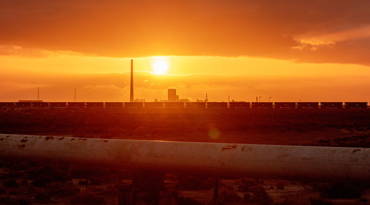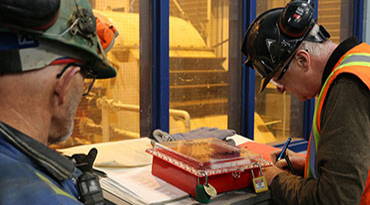Environmental impact
We operate our business in an environmentally responsible way. Our aim is to prevent harm to the environment and the community. We will build trust with our key stakeholders by meeting our commitments and maintaining open and honest communications.
Our environmental strategies are formulated in close cooperation with external stakeholders and their execution are integrated into operational decision making and management processes.
Minimizing environmental impacts represents one of the principal challenges for our industry. Our metal products meet society’s needs worldwide and are inherently recyclable. We are located within communities who have expectations of us, which we must meet.
The environmental aspects demanding our greatest attention relate to water, energy and climate change, emissions to air, waste, biodiversity and land management, and material stewardship. Recognising the importance of environmental performance to our business, we treat the management of these issues with priority. Responsible environmental stewardship is integrated into our business planning, management systems and day-to-day operational decision making.
Nyrstar’s approach to environmental management is embedded in our company values and the culture we want to foster. Of particular relevance to environment, our values and culture require us to Prevent Harm establishing an imperative for our people to act and take decisions with a view to minimising environmental impacts.
Further, our Environmental Policy sets out our environmental management principles and commitments that all operations must respect and follow.
All Nyrstar sites are required to implement environmental management systems (EMSs) in alignment with the Nyrstar SHEC Management Framework. The EMSs help to drive continuous improvement in environmental performance by ensuring environmental impacts are identified, understood, controlled and subject to regular monitoring and review. The systems implemented at Nyrstar’s smelters are also certified to the ISO 14001 environmental management system standard. In our Mining segment, the East Tennessee Mines complex achieved certification to ISO 14001 in 2014.
Our SHEC Management Framework provides guidance for minimum requirements that apply to our operations. The following considerations are factored into our business processes planning:
- compliance with proven Best Available Techniques to reduce emissions to water, land and air
- in procurement activities and design of new equipment, plant or processes, it is evaluated if a more energy (or other resource) efficient, or less noise producing option is available
- reducing waste generation from operations wherever possible. Where waste is produced, we ensure it is processed or disposed of in a responsible way and due diligence on the disposal destination is undertaken
- logistics companies to transport are encouraged to transport materials and goods in the most energy efficient way
- whenever possible we cooperate with affiliated organizations to identify synergies in logistics
- investigating possibilities to shift from carbon intensive energy sources to renewable energy sources
- evaluating options to reduce ground water usage where scarcity exists and minimising the consumption of first-use treated water supplies
- managing our operations to prevent pollution of the soil and groundwater
- continuing to implement projects to address the legacies of past practices that may cause environmental harm at our sites
- maximising the value recovery from mineral resources to minimize waste or by-product generation. Where by-products are generated, resource recovery or reuse opportunities are pursued.
Material Stewardship
Material stewardship relates to the responsible care and management of a commodity or material through its life cycle, from extraction and processing to use, recycling and disposal.
Material stewardship is also closely linked to our strategic mission to capture the maximum value inherent in mineral resources and the benefits this brings in terms of efficient resource use and reduction of wastes.
We expect the importance of material stewardship risks and opportunities to increase in step with growing societal interest in responsibly produced materials and as increasingly scarce mineral resources demand more efficient operations.
Minimisation of environmental and social impacts in the value chains of minerals and metals is inherently a shared responsibility of the actors involved in bringing metals to the market.
Nyrstar responsibly sources raw materials to produce the industrial and critical metals, that advance everyday life. Responsible sourcing reflects our commitment to consider social, ethical, and environmental factors in our products, supply chains, and supplier relationships. We adhere to all applicable laws and the voluntary standards set by the industry organizations to which we subscribe. Our Responsible Sourcing report is available here.
For Nyrstar, this shared responsibility does not only involve the extraction and production activities that we directly manage but also extends to the downstream processing and use of our products. The mining concentrates and smelting by-products that we sell to our customers sometimes contain naturally occurring elements which, if not handled responsibly, can have negative effects on human health and the environment.
From a product stewardship perspective, we therefore have an obligation to provide customers and other users of our products with information about the contents and hazards of the materials we supply. All our products have safety data sheets that provide information on product composition, hazards to human health and the environment, appropriate handling and storage, and emergency response.
Beyond this obligation, good risk management dictates that we assess and confirm the capabilities of our customers to handle our products and by-products responsibly. This is particularly relevant for customers processing Nyrstar mine concentrates or smelter by-products that contain deleterious substances.
Nyrstar undertakes a risk-based approach to stewardship due diligence in upstream and downstream supply chains. If a risk of social (e.g. human rights abuses) or poor environmental practice is identified, Nyrstar will undertake due diligence activities commensurate with the risk identified.
From a resource stewardship perspective, we are investing in technology that allows us to maximise the extraction of valuable metals from our feed materials, by-products and residue materials.
By taking advantage of by-product synergies we are able to decrease the amount of materials disposed as waste and to reduce the need for virgin-source materials.
Central to this strategy is the redevelopment of Port Pirie into an advanced metals recovery and refining facility.
Continuous Improvement
Nyrstar adopts the international ISO standards for occupational health and safety, environment, quality and energy management as a basis for continuous improvement of the organization.
Furthermore, we establish clear accountabilities at all levels of the organisation for achieving our sustainability objectives and to integrate our sustainability ambitions into operational management decisions and processes.
We continuously support the specific opportunities to innovate that allow us to make a positive contribution towards improved sustainability and to distinguish ourselves from our competitors in the marketplace.


